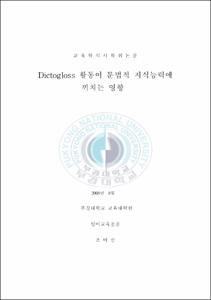Dictogloss 활동이 문법적 지식능력에 끼치는 영향
- Alternative Title
- The Effect of Dictogloss on English Grammatical Knowledge
- Abstract
- we cannot overlook the importance of English as a global language. Korean English teachers have focused on the communicative methods to teach their students fluency. So English education policy had a tendency to ignore accuracy. Nowadays, however, focus on form, which draws learners' attention to a specific language form in a communicative context, has begun to stand out and it is helping to improve the accuracy of learners' language use. Dictogloss is one of the techniques that people who advocate focus on form often use. In this group activity, learners reconstruct the text with their peers. It is an effective way to teach a foreign language in the classroom.
The purpose of this study is to investigate the effect of Dictogloss on English grammatical knowledge. The particular focus is on articles and verbs. For this study, seventy-four second grade middle school students participated in the experiment. They were divided into two groups, an experimental group and a control group. Each group consisted of thirty-four students. The groups were also classified into upper, middle, lower levels respectively. The experiment was carried out over eight weeks. During this time, the experimental group was given Dictogloss tasks using several texts including articles and verbs and the control group undertook the listening and reading classes from the 7th National Korean Curriculum.
The results of the experiment conducted in this study are as follow.
First, as for articles, the experimental group performed tasks better than the control group in the post test results. That shows that tasks which emphasize students' cooperation like Dictogloss are helpful for the study of articles.
Second, in terms of verbs, there was no significant difference between the two groups in the post test results. This means students can improve their skills with verbs over time, not only through Dictogloss but also using other tasks.
Third, as for the upper level students, there was no significant difference between the two groups regarding articles, but the average score of the experimental group was better than that of the control group. In terms of verbs, the experimental group showed a significant difference from the control group.
Fourth, as for the mid-level students, the experimental group showed a significant difference from the control group in use of both articles and verbs. This shows rewriting and cooperating tasks through Dictolgoss lowered the affective filter of students and was effective in helping them understand the usages of articles and verbs.
Fifth, as for articles and lower level students, significant differences did not appear between the groups in the post test. However, in terms of verbs, the control group showed results which differed greatly. This means that individual activities rather than group activities can be more effective for lower students.
According to the above the results, I'd like to suggest the following.
First, English teachers should pay attention to preparing and developing texts aimed for improving students' output skills. Second, teachers have to be concerned about the lower level students' learning skills. Third, further study about the acquisition of other grammatical knowledge through Dictogloss should also be performed.
- Issued Date
- 2008
- Awarded Date
- 2008. 8
- Type
- Dissertation
- Publisher
- 부경대학교 교육대학원
- Alternative Author(s)
- Cho,Mi sun
- Affiliation
- 부경대학교 교육대학원
- Department
- 교육대학원 영어교육전공
- Advisor
- 오준일
- Table Of Contents
- 〈표목차〉 = iii
〈그림목차〉 = iv
〈부록목차〉 = v
ABSTRACT = ⅵ
I. 서론 = 1
1.1 연구의 필요성 및 목적 = 1
1.2 연구문제 및 제한점 = 3
II. 이론적 배경 = 4
2.1 제 2 언어의 습득과 문법지도 = 4
2.2 형태초점 의사소통 교수법 = 5
2.3 Dictogolss의 정의와 특징 = 20
2.4 선행연구 = 28
III. 연구방법 = 32
3.1 연구 대상 및 기간 = 32
3.2 연구 도구 = 35
3.3 실험의 실제 = 37
3.4 자료의 수 집방법 및 분석 = 47
IV. 결과 분석 및 논의 = 48
4.1 실험전·후 평가 문항 신뢰도 검사 결과 비교 = 48
4.2 집단 간 실험전·후 평가 결과 비교 = 49
4.3 집단 내 수준별에 따른 평가 결과 비교 = 52
V. 결론 및 제언 = 58
〈 참고 문헌〉 = 61
부록 = 65
- Degree
- Master
- Files in This Item:
-
-
Download
 Dictogloss 활동이 문법적 지식능력에 끼치는 영향.pdf
기타 데이터 / 867.8 kB / Adobe PDF
Dictogloss 활동이 문법적 지식능력에 끼치는 영향.pdf
기타 데이터 / 867.8 kB / Adobe PDF
-
Items in Repository are protected by copyright, with all rights reserved, unless otherwise indicated.